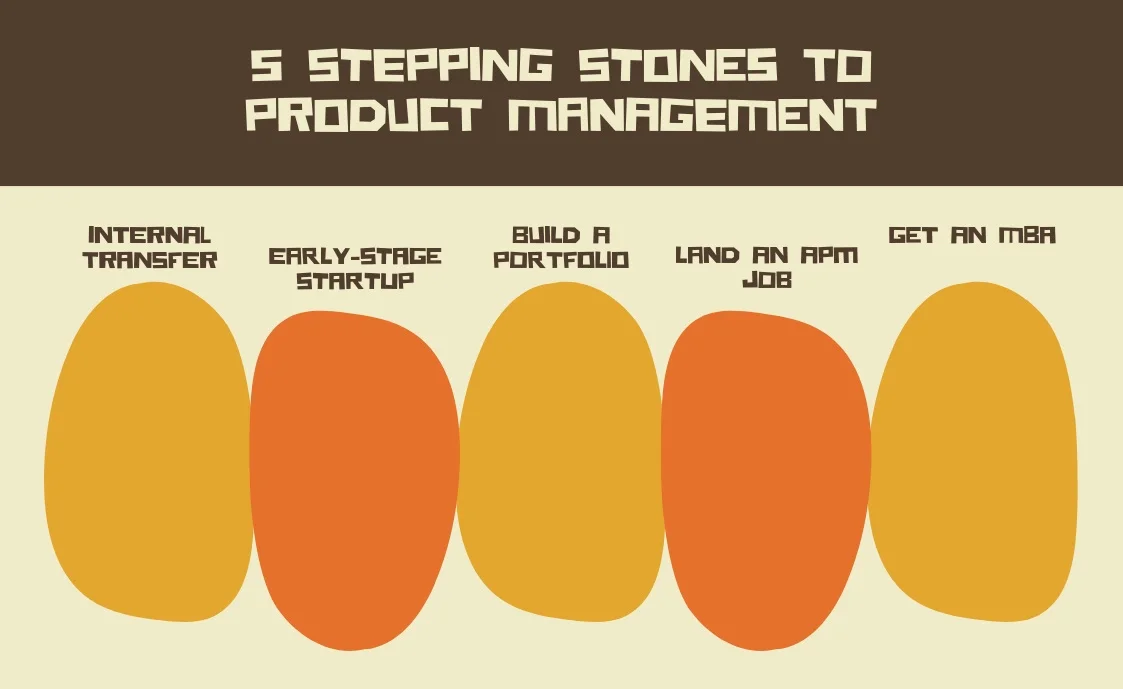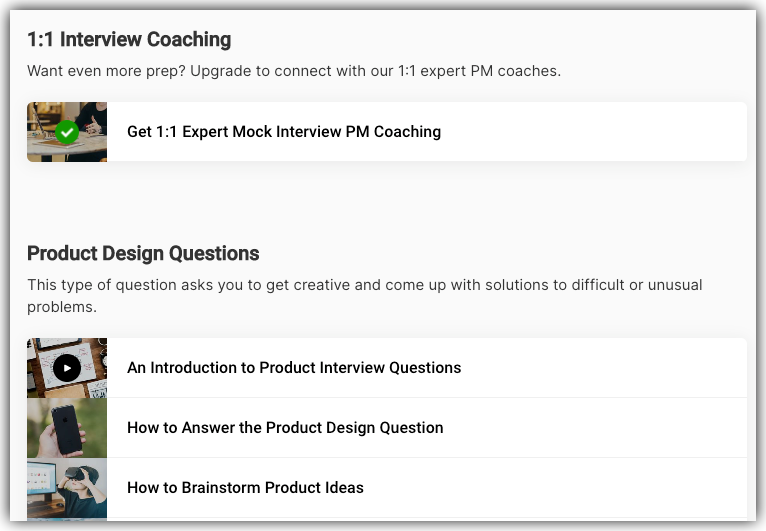Step 1: What’s Product Management All About?
Overview: Product Management leads the development of new products. Given that tech companies are usually organized around products (e.g., Gmail, Google Maps), this is often the most important role within the company.
AKA: PM
Example project: Lead a new app from the initial vision to customers downloading it to making it even better!
What you do all day: Learn about your audience, develop new concepts, create product blueprints, manage a cross-functional team to bring the product to life, review metrics
Roles: Associate Product Manager (more junior), Product Manager (more senior), Technical Product Manager (focused on more technically-complex products)
What they look for: People with technical backgrounds (since you’ll work so closely with engineers), UX/design understanding (since you’ll need to make a technical product easy for actual customers to use), and business/leaderships skills (since you’ll be responsible for coordinating a cross-functional team to deliver business results)
Sample job: Product Manager, Zenefits
Current PM job listings: Indeed (best for mid-to-large companies) | AngelList (best for startups)
Step 2: Would You Be a Good Fit for Product Management?
Ask yourself if you'd love doing these kinds of common PM activities:
Learning about current and prospective customers
Developing a vision for a new product based on customer needs
Translating that vision into detailed specifications to be built out
Motivating cross-functional partners (engineers, designers) to solve challenges and ship your product on-time
Evaluating key metrics to share with execs and optimize performance
If your answer is "Yes" to the majority of activities, you'd likely be a good fit for PM.
And if you’re not sure, check out Find Your Fit - my step-by-step guide to exploring different tech roles and choosing the perfect one for you:
Review the Top 10 roles open to anyone
Get a personalized recommendation of your best fit
Position yourself to win that role
Step 3: What Skills Do You Need for Product Management?
For each major activity, I've listed the most common keywords from across dozens of job descriptions, as well as a sample resume bullet:
Learning about current and prospective customers
Keywords: usability studies, research, market analysis, competitive position, pain points, personas
Sample Bullet: Conducted usability study with inactive users to identify the top 3 reasons they'd stopped engaging with the site
Sample Product Roadmap
Developing a vision for a new product based on customer needs
Keywords: ideation, product vision, roadmap, product lifecycle, value proposition
Sample Bullet: Set the vision for a new photo sharing app, from high-level concept to roadmap and milestones
Translating that vision into detailed specifications to be built out
Keywords: product requirements, specifications, user interfaces, wire frames, mock ups, release plans, go-to-market, user stories, prototypes, test plans, release checklists
Sample Bullet: Built out detailed product specifications for viral sharing feature, leading to a ship date one month earlier than expected
Motivating cross-functional partners (engineers, designers) to solve challenges and ship your product on-time
Keywords: collaborate, daily workflow, leadership, shared vision, consensus, engineers, designers, ship on time and within budget, milestones
Sample Bullet: Led daily standups with engineering and design team to overcome roadblocks, achieving 90% feature functionality after just three months of development
Evaluating key metrics to share with execs and optimize performance
Keywords: metrics, dashboard, SQL, A/B test, presentation, senior leadership
Sample Bullet: Ran A/B test to determine the most effective onboarding flows, increasing new user sign-ups 75% month over mont
If you have these skills but are having a hard time building them into your resume or LinkedIn profile, check out my Land Your First Tech Job course - which walks you through the entire application and interview process on the way to winning a PM job:
How to build a killer PM resume
How to land a referral for PM positions
How to prep for PM case interviews
Step 4: What Are the Paths to a Product Management Job?
There are typically five ways to break into a PM role, depending on where you’re coming from:
If you already work in a tech company, the easiest way is to pursue an internal transfer:
Find a PM you admire and tell them about your interest in exploring their career path. Then volunteer to help with their projects and pick-up tasks they’re too busy for.
If you’re able to build up a track record of having done PM work successfully, the next time there’s a PM opening, guess who’s going to have the best shot as the insider candidate?If you don’t work at a tech company but are willing to hustle even harder, try pursuing a similar strategy as described above but at a startup:
Find an early stage startup on AngelList and reach out to the founder with this pitch: “I love what you guys are doing and know that resources are tight at your stage. Any chance I can help you with your product development - even on a pro bono basis?”
And then, once you have a chance to prove your skills during this risk-free trial, when they’re ready to hire their first few full-time PMs, you’ll be first in line.If early stage startups aren’t your cup of tea, consider trying to build a portfolio on your own:
You could volunteer for PM projects at NGOs on Catchafire, take on development projects on Upwork (by serving as the PM and then outsourcing the coding to another freelancer), or even build your own product through Startup Weekend.
No matter which path you choose, you’ll now have a list of robust PM experiences that you can use to hunt for a full-time role.If you’re at the beginning of your own career and are open to working for a large tech company, consider an Associate PM role.
While most PM roles expect you to have some experience since it’s such a critical leadership position, the biggest companies can afford to invest in training-up brand-new grads. So check out the APM roles that hire annually at places like Google, Facebook, and Uber.
Just be sure to prep thoroughly for these interviews as the competition for the limited number of APM roles is stiff!And if you’ve already begun your career but are considering going back to school, know that the most direct path is often through an MBA program.
While business schools are mostly known for turning out consultants and bankers, many of the largest public and private tech companies turn to MBA programs for the leadership skills they seek in their newest crop of PMs.
Just know that an MBA by itself is no guarantee that these firms will consider you. While companies like Amazon are known for hiring MBA PMs no matter their background before school, more technically-driven firms like Google often look for MBAs who also have an engineering background.
And if you need help navigating these pathways, I’m happy to coach you through the different options.
We can cover any of the following:
How to network your way into startups
Whether to go back to school or land a job on your own
How to leverage your degree to maximize PM opportunities
Step 5: What PM Training Programs Are Out There?
Product Management interviews usually focus on your experience designing and building products. And for this reason, I'm not a big fan of classroom-based, theoretical approaches to learning Product Management. After all, even if you come out of one of these programs knowing how to be a PM, you'll still need to prove it in the interview room. And the best way to do that is to take a course that helps you build out a portfolio of actual product plans.
As such, here are several action-based PM courses to consider:
Disclosure: I’m an affiliate for some of the 3rd party courses listed on the site, which means I may earn a small fee if you choose to enroll (which I use to keep Break into Tech running).
Step 6: What's One Week PM Like?
One Week PM is an online course created by Kevin Lee, a former PM at AltSchool and Kabam - two of the Bay Area's hottest startups (having raised a combined $400M!).
But what I admire the most about Kevin is how hard he hustled to land those jobs. Because he actually started his career in finance - i.e., about as far away from tech as you get. And yet, he figured out how to crack the code not just on this tricky industry, but on the absolute sexiest job within it.
And so if you're going to have anyone teach you how to break into Product Management, who better to do so than the person who made the biggest leap to get into this role?
That said, having taken Kevin's course myself, I'm also really impressed with his teaching chops. There are probably a dozen courses where you can watch techies drone on about the benefits of one coding language or another - all the while getting no closer to your goal of becoming a PM. But Kevin's lessons are tight, focused on only what matters most (it's not 27 Week PM, after all!), and, most importantly, super actionable.
As mentioned in the last section, you won't just watch a bunch of boring videos and then having nothing to show for it. Instead, you'll actually build out a whole product plan - from user testing to roadmap - which will be Exhibit A when it comes time to interview for this role.
Step 7: What If I Need Help with PM Interviews?
If you’ve built PM skills but are having a hard time closing the deal in interviews, then consider Exponent’s Product Manager Interview course. There are three things I really love about their program:
Seeing > Listening. While anyone can tell you how to be a better interviewee, Exponent actually shows you - through hours of mock interviews where you see real hiring managers and candidates go through the same exact questions you’re about to face!
Interviewing Requires Emotional Support. To do your best in the interview room, you need to know more than frameworks - you need to know you’ve got the support to face down this daunting challenge. And so the fact that Exponent’s course grants you access to a Slack community full of folks in the same boat who can empathize with the challenge and help you prep with mock interviews is a big advantage.
Live Coaching When You Need It. Sometimes you need more than a course to make it to the promised land. So that’s why I like that Exponent scales from an inexpensive online course to offer full coaching packages, complete with a roster of coaches from Google, Amazon, Etsy, etc. Plus you can always request a coaching session a la carte!







